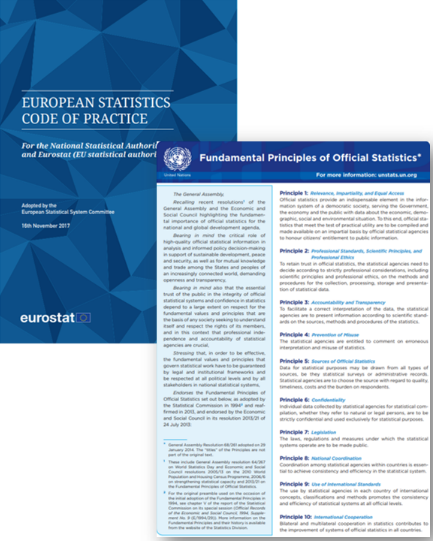The well-known book Love in the Time of War tells a story of two people whose marriage is irrevocably shaped by the harsh realities of a war. Well, this is a story of two people whose lives are shaped by the harsh realities of politics now… and a bit more… just because of the commitment of the two people to protecting the integrity of official statistics.
My first thought in reading a post about the dismissal of Dr. Gordana Radojevic from her position was: “Oh no! Another case like Dr. Andreas Georgiou.” Who is Dr. Andreas Georgiou? And who is Dr. Gordana Radojevic? What is their connection and what do they have in common?
Well, Dr. Georgiou is a former Director of the Greek Statistical Office (ELSTAT) who has been involved in a court case for slander in Greece for the past 10 years. Slander charges relate specifically to a public statement he made in his official role as Director of ELSTAT while fulfilling his responsibility to defend the official statistics for Greece produced under his leadership. The Supreme Civil and Criminal Court of Greece sentenced him to two years on probation for violation of duty – for not submitting the revised 2009 deficit and debt statistics of Greece for approval before transmitting them to Eurostat – the Statistical Office of the European Union (EU) – in November 2010. His statement was about defending the revision of the misreported deficit and debt statistics of Greece for the period 2006-2010. Debts and deficits are very politically relevant statistics, inspiring legislation and executive decisions that affect many people. Read more about Dr. Georgiou here.

https://greekreporter.com/; http://monstat.org/
Dr. Radojevic is a former Director of the Statistical Office of Montenegro (MONSTAT). According to news from different sources, Dr. Radojevic was dismissed from her position of Director by decision of the Prime Minister of Montenegro -without holding a session, but based on the obtained consent of the majority of members of the Government. Dr. Radojevic posted that the dismissal was “based on the reasons for which proofs were not presented, without respecting the legally prescribed procedure while I was on a sick leave due to COVID-19 infection.” In the previously mentioned post about the dismissal, a formal reason for the dismissal is given as: “the data from the Report on the work of the Statistical Office [of Montenegro] for 2020 indicate irregularities in the work of this administration.” Some parliament members, as well as Dr. Radojevic herself, provided further details on the reasons – one being her refusal of the Government rules developed in August 2021 for conducting the upcoming Census of Population, Households and Dwellings in Montenegro in November 2021. Initially, the census was supposed to be conducted in April 2021, but it was postponed primarily due to the lack of the Census Law, which is the legal basis for carrying out the Census. The Census Law was drafted later than planned due to the pandemic, and then approved by the relevant EU experts and given to the Government of Montenegro in March 2021 for its official adoption in the fourth quarter of 2021. The Government decided in August 2021 to change the rules and conduct the Census in the fourth quarter 2021 even though the Census Law was not yet approved – which Dr. Radojevic did not agree with. The President of the Montenegrin Cultural Network believes that Dr. Radojevic was dismissed “because she is an obstacle to falsifying the census results” – in short, for doing her job.
Why do governments intervene in the work and lives of directors of statistical offices?

www.ceotodaymagazine.com
“Data are the new gold!” Data give power. Official Statistics are applied across a range of disciplines – economics, political science, sociology, psychology, anthropology, etc. – and have become a key feature of decision-making related to policies and social science. The official statistics that dominate political debates are largely national in character: poverty levels, unemployment, GDP, net migration, etc. The national statistical offices are still the official producers and carriers of most of the official national statistics (developed based on approved scientific methodologies, procedures, and quality assurance rules) – meaning the national statistical offices become more powerful and influential as the demands on data and statistics increase. This also leads to increased pressure on the producers of official statistics, particularly when governments like to present their economy in the best possible light.
The demand for more and faster data can force (positive) changes in data/statistics production processes, through improving things such as digitalization, standardization of methods, and procedures used. However, the flip side is the increased potential for distortion of data and methods, rules, and/or quality because of lack of full digitalization and standardization in the face of increasing demands and pressure. The national statistical authorities are governmental bodies and they are financed by the governments. The governmental budgets for the production and interpretation of official statistics influence the possibilities for improving the efficiency of statistics production processes, collecting more and better data, and supporting more justified decision-making around the economy. So much is connected, and … so much can be influenced.
Recent studies and papers shed light on how governments manipulate the quality of the data and associated summary statistics, especially macroeconomic. Roberto Aragão (University of Amsterdam) and Lukas Linsi (University of Groningen) explored manipulation typology (distinguishing four types of manipulation) on three known case studies, one of which was the Greek case related to Dr. Georgiou. They presented their results in the paper “Many shades of wrong: what governments do when they manipulate statistics” (2020). Manipulation of COVID-19 related statistics in Brazil was the subject of one of the first posts on this blog.
As the situations of the two directors of the national statistical offices show, there are also other ways for politics to influence statistics at the level of those producing them; these include manipulating the humans involved (professionals in their field) through ignoring their professionalism, making poor decisions based more on political goals and less on professional knowledge, or just intruding directly into the work (counter to the usual scientific methods and procedures).

Principle 1 of the United Nations Fundamental Principles of Official Statistics as well as the Principle 1 of the European Statistics Code of Practice give statistical offices the right to react to misuse of statistics and in general, and as also stated in the Paragraph 20 of the Preamble to EU Regulation 223/2009 of the European Parliament and of the Council, state that the national statistical authorities of the EU should enjoy professional independence and ensure impartiality and high quality in the production of European statistics (in accordance with the principles in the European Statistics Code of Practice).
Knowing very well the UN and European Statistics Code of Practice Principles, as formerly dealing with quality management in a statistical office and currently dealing with standardization and digitalization of statistical production system, and reading about happenings to former directors of the national statistical offices, made me ask myself – What has happened to independence, impartiality, and quality of the statistical authorities? How much is national politics shaping the statistical authorities and their work over the last couple of decades and after the development of the Fundamental Principles of Official Statistics? The reality is that not even these established principles and legislations, to which the statistical authorities committed themselves, can guarantee the desired scientific freedom, responsibility and impartiality; and in the broadest view, democratic and human rights in general.
In my opinion, official statistics is inevitably shaped by governments, state economies and politics, no matter how much statisticians wish to be professionally independent, impartial and produce high quality data, which should serve Government, economy and politics in general.





